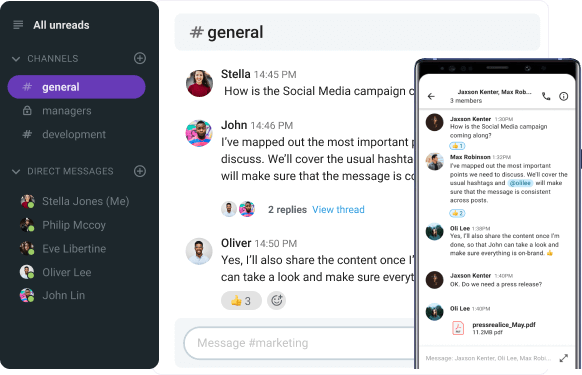Did you know that rejection actually hurts, as in physical pain?
According to an fMRI study of social exclusion, getting rejected activates the same regions in the brain as physical pain.
Could that have something to do with our reluctance to ask for help in the workplace?
And, how does one politely ask for help at work — hopefully avoiding rejection?
These are the questions we’ll tackle in this article, so stay tuned!

Table of Contents
How to ask for help politely: 7 Tips for requesting assistance in the workplace
If you want to know how to ask for help politely in a message or an email, there are several tips you should keep in mind.
You can try to:
- Help others to inspire reciprocity,
- Clarify what you want to ask,
- Make your request for help S.M.A.R.T.,
- Identify the right person to ask,
- Consider the tone of your message,
- Express your gratitude, and
- Create a workplace culture where asking for help is encouraged.
Let’s put these tips into practice.
#1: Help others to inspire reciprocity
According to the authors of a 2021 paper on the benefits of being helpful, there are two potential benefits to lending a helping hand to your fellow team members:
- Inspiring indirect reciprocity in those who observed your actions.
Let’s say Nick saw Eve helping her coworker finish their assignment. Going forward, Nick might be more inclined to help Eve because he perceives her as selfless.
- Gaining a reputation for being helpful.
In other words, Nick might tell others around the office about Eve’s selflessness, increasing her social capital.
So, if you continually help others, you can expect to get help in return.
Moreover, being helpful to others may make you feel more deserving of their help and, therefore, more willing to ask for it.
Here’s an example of that conversation via the business communication platform, Pumble:
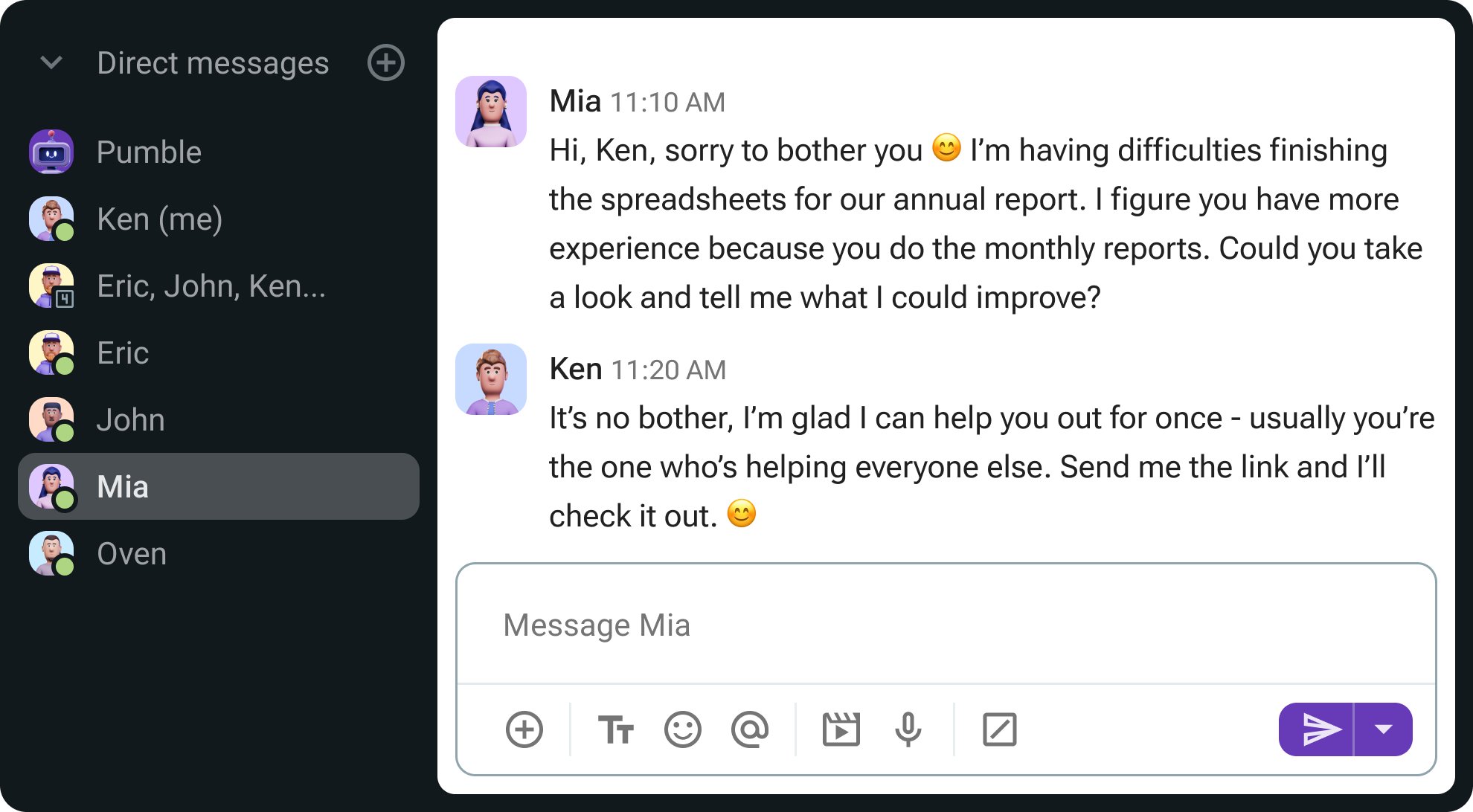
#2: Clarify what you want to ask
When you’re more open to helping others, you’re much more likely to ask for help yourself.
Still, you can make the process even easier by understanding precisely what kind of help you need.
To be sure who you need to ask for help and what exactly you need them to do, try to formulate your needs first.
So, think about your problem and write down:
- The information you lack and
- What your goal is.
One of the experts we’ve contacted on this matter, HR Specialist Faye Casement, agrees with this approach:

“Think about what you need help with and be specific in your request. This makes it easier for the others to understand how they can assist and reduces the chance of frustration on both sides.”
#3: Make your request for help S.M.A.R.T.
You’ve probably heard of S.M.A.R.T. goals, but now we’re going one step further and introducing S.M.A.R.T. requests for help.
If you want to know how to ask for help politely but professionally, consider the advice from the popular book on the skill of asking for help — All You Have to Do Is Ask.
According to the author of the book, sociologist Wayne E. Baker, a well-formulated request for help should be S.M.A.R.T.:
- Specific — Don’t beat around the bush, clearly state what you need help with to improve your chances of getting help.
- Meaningful — Explain to your coworkers why the request is essential to you, even if you think it’s self-evident (it rarely is, to be honest).
- Action-oriented — Think of your request as a call to action, ultimately leading to your goal.
- Realistic — Your request should be within the realm of possibility.
- Time-bound — State when you need help and what is your deadline.
If you formulate your requests with these points in mind, people will be more likely to help you.
Let’s see an example of this method in an exchange in Pumble, a team communication app.
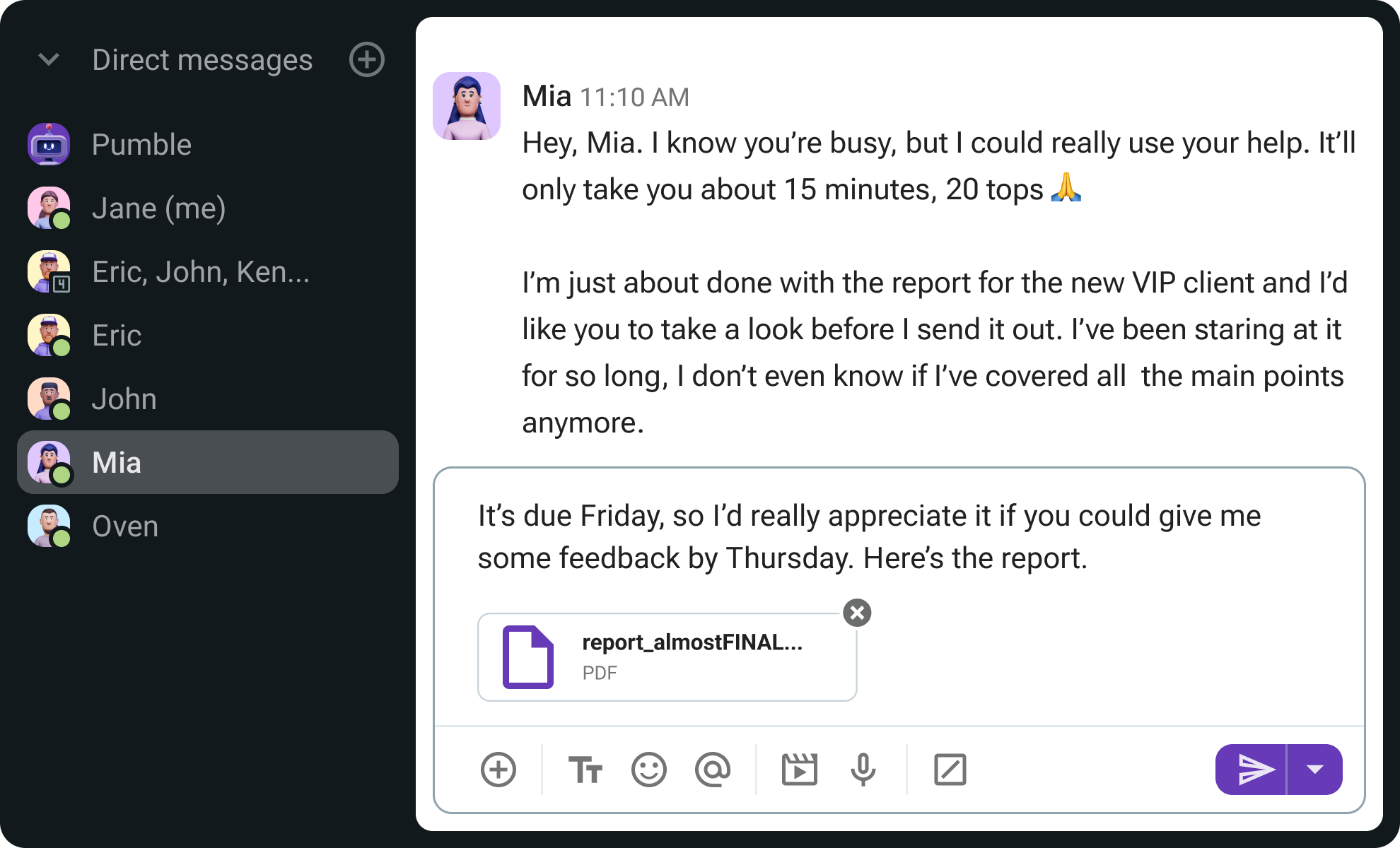
In our example, Anne covered all the points from the S.M.A.R.T. criteria, increasing the chances of getting the help she needs.
She:
- Stated her problem,
- Explained why she was in a rush,
- Defined what needs to be done, and
- Told Eve her deadline.
#4: Identify the right person to ask
You might have to ask a few people before finding the right assistance, so don’t get discouraged if, at first, you don’t succeed.
For example, if you need help with a task at work, it’s only natural to ask the person on your team you’re closest to.
But, what if they also lack the expertise or experience you need?
In that case, you shouldn’t be surprised if they decline your request for help.
When in doubt, ask the person most likely to have the skills you need, such as a senior coworker or a mentor.
Even if they can’t help you, they’ll probably point you in the right direction.
#5: Consider the tone of your message
Now that you’ve found the right person for the task, all that’s left to do is — ask. Easy enough, right?
But, how do you politely ask for help at work?
Well, that’s the tricky part.
If you want to improve your chances of getting a positive response, you can:
- Try not to sound too demanding — Provide sufficient context so it doesn’t come across as if you think they’re obliged to help you.
- Be kind and humble — Don’t be afraid to show your vulnerability. Admit that you’ve tried to do something but failed, and that’s why you need help.
- Show trust and respect — Demonstrate your willingness to learn from the person you’ve asked for help.
- Mind the timing — Don’t ask for help at the last minute. Check with the other person if they’re available to talk.
Let’s look at an example in the team collaboration software Pumble.
Jim, a content writer, is asking his mentor Sabrina for help with the text he’s working on.
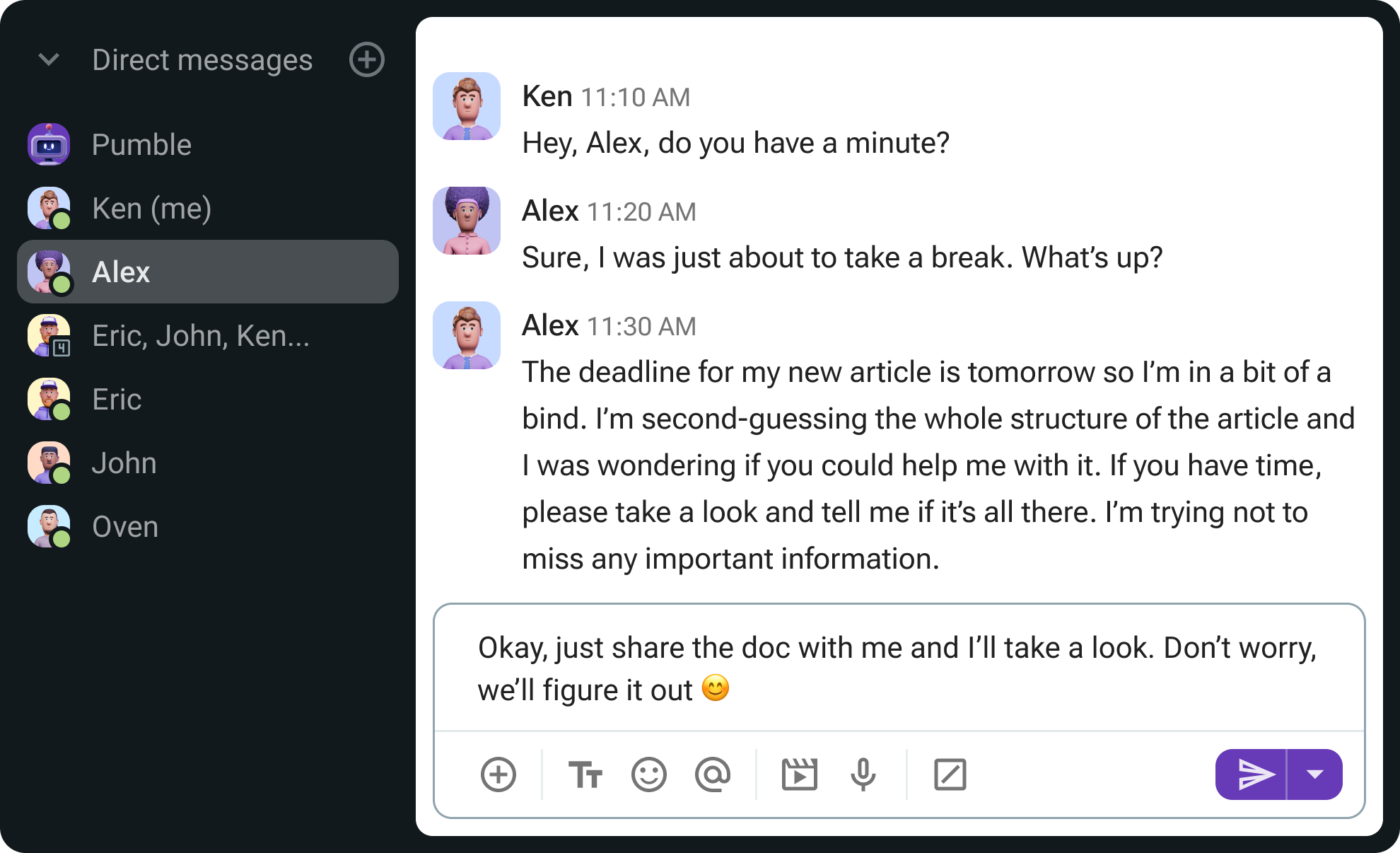
Jim first checked if Sabrina had time to talk.
After Sabrina gave the go-ahead, Jim explained his problem and asked for help. He has shown his vulnerability and concern.
Thankfully, Sabrina agreed to help and assured Jim everything would be fine.
💡 PUMBLE PRO TIP
If you struggle with asking questions in a professional environment, check out our guide to asking better questions:
#6: Express your gratitude
Showing appreciation for help is one of the key (often overlooked) steps in learning how to ask for help politely.
Whether a person can help you or not, you need to at least thank them for their time and effort.
However, thanking someone you work with requires just as much forethought as asking for help in a message or an email.
With that in mind, here are some tips to help you formulate the perfect response:
- Pinpoint exactly what you’re grateful for.
- Choose the right medium to give thanks.
- Be mindful of the level of formality you need to employ.
- Make it short and sweet.
In any case, expressing your gratitude should make the recipient more likely to help you (and others) in the future.
#7: Create a workplace culture where asking for help is encouraged
The great thing about understanding how to ask for help politely in a message or an email is that it’s bound to rub off on other people at work.
However, if you want to take an even more active role in creating a positive work environment that encourages people to ask for help when they need it, here are some additional steps you can take:
- Identify the barriers to asking for help — Look at your organizational communication and identify the obstacles to asking for help. Are those who seek help viewed as incapable or weak? Are leaders giving the impression that they never need any help? Is there a lack of trust among the team members? Once you identify the barriers, you can deal with them.
- Reinforce your strengths — Understand which actions encourage your coworkers to ask for help, strengthen them, and apply them to all departments.
- Model asking for help — When employees see that their leaders don’t refrain from asking for advice or assistance, they are more likely to follow their lead.
- Reward asking for help — Recognize employees who seek help and try to reward them.
—
Now that we’ve covered actionable steps, let’s list some useful phrases to help you become a better communicator when you need help at work.
How to ask for help politely: Phrases to use when you need assistance at work
There are many different ways to ask for help, depending on the formality you want to use and the urgency of your situation.
For example, you might say:
“Could you please do me a favor?”
“Can you give me a hand with this?”
“Would it be too much trouble for you to…”
“I could do with some help, please.”
“Could you spare me a few minutes of your time, please?”
If you ever find yourself in a bind at work, you can use any of these phrases to ask for help.
However, if you need more nuanced tips and details on how to politely ask for help over a message or email, check out the rest of the examples we’ve compiled below.
💡 PUMBLE PRO TIP
If you want to discover more useful phrases for different communication situations at the workplace, check out our following texts:
General phrases for asking for help
Asking for help isn’t always easy, but it doesn’t have to be complicated.
When you’re not sure how to ask for help in a message or in person at work, a simple general phrase will always do the trick.
Here are a couple of examples to get you started when you’re lost for words:
“Could / Would you do me a favor?” — for politely asking for help from people you know well
“Hey, Jenna, I’m glad I ran into you. Could you do me a favor and check the due date for the Johnson project?”
“Could I ask / bother you / trouble you…” — a more polite way of asking for a quick favor
“Ms. Perez, could I trouble you to book a hotel for our business trip?”
“Can you give me a hand with this?” — for asking people you know well for help
“Robert, can you give me a hand with these boxes I need to take to the warehouse?”
“Lend me a hand with this, will you?” — a little more polite and old-fashioned direct request for help
“I need to move this table and make room for one more chair. Lend me a hand, will you?”
“Could you help me for a second?” — a more polite way of asking for a quick favor
“Mr. Scott, I’m glad you’re here. Could you help me for a second?”
“Can I ask a favor?” — a general way of introducing a request for help
“Can I ask a favor? I need someone to log into my computer at the office and upload a file to my cloud storage so I can work on it at home.”
“Please, could I ask you for some advice?” — a direct request for help
“Kim, you’ve been in this company much longer than I have. I am having trouble with some clients. Please, could I ask you for some advice?”
More formal phrases for asking for help
Not sure how to ask your boss (or a colleague you don’t know so well) for help?
Might be best to err on the side of caution and go with a more formal request for help.
Here are some examples to help you get the gist of how to ask for help professionally in a more formal setting.
“I could use some help if you have a moment.” — a direct request for help that considers the helper’s time
“I’ve been feeling somewhat overwhelmed with the scope of my responsibilities. I could use some help with this task, if you have a moment.”
“Would you mind giving me a hand?” — a semi-formal way to request assistance
“Hey Jackson. Would you mind giving me a hand with this report, if you’re not too busy?”
“I wonder if you could help me with this?” — polite and can be used with people you don’t know very well.
“I’m not sure if you’re the right person to ask, but I appreciate your time. I wonder if you could help me with this document. I heard you know a lot about this topic.”
“I would be most grateful if you could give me some help.” — a formal, polite, and direct way of asking for help.
“Mr. Brown, I am afraid I don’t have enough information on this case. I would be most grateful if you could give me some help.”
“Would it be too much trouble for you to…” — a polite and direct request for help
“Ms. Peterson, would it be too much trouble for you to give me an estimate on the delivery time frame?”
Phrases for asking for help when you are in an emergency
Desperate times don’t necessarily have to equal desperate measures. At least when it comes to asking for help at work.
You might be in a rush, but you can still uphold basic business communication etiquette.
Let’s take a look at some examples of how you can ask for help politely and professionally when you’re in the eye of the storm.
“I could do with some help, please.” — a pretty direct way of asking for help when you’re in a pickle
“Hello, everybody! I’m new to the company and could do with some help, please!”
“I can’t manage / I’m in over my head. Can you help?” — when you are desperate for help
“Stephen, I have too much work to do, with the holidays coming up. I can’t manage everything. Can you help me?”
“I need some assistance, please.” — a direct request for help when you don’t expect the answer to be “No”
“I need some assistance with this problem on my computer, please.”
“I know you’re busy but could you spare me a few minutes of your time, please?” — you respect that the other person is busy and you need them for just a few minutes.
“Jenny, this report is almost finished, but I’m horrible at spreadsheets. I know you’re busy but could you spare me a few minutes of your time, please? I need you to look at one chart — I know you are good with spreadsheets.”
Why do we hesitate to ask for help?
Even though we all need some help occasionally, many people hesitate to ask for it.
Why is that?
In his book All You Have to Do Is Ask, sociologist Wayne E. Baker identified 8 main barriers to asking for help:
- We are too self-reliant.
- We think others are unwilling or unable to help us.
- Our organization’s structure, systems, or procedures get in our way.
- We perceive there to be social costs of seeking help. In other words, we believe that others will see us as weak, lazy, or incapable of doing our job if we ask for help.
- We don’t know what to request or how to request it.
- Our workplace culture lacks psychological safety.
- We worry we haven’t earned the privilege of asking for help.
- We fear others perceiving us as selfish.
We’ve already addressed some of these problems in our guide to asking for help professionally.
However, we also found it helpful to consider the advice of Daniel Galletta, a Psychologist who explained that most of these preconceived notions come from within:

“You should acknowledge that judgment for asking for help comes from within, not from others. In addition, instead of seeing questions as a sign of stupidity or inexperience, you should reframe them as a core competency. In other words, it’s an expectation of your role that you do ask questions in order to become a subject matter expert in your domain and excel at your job.”
Why is asking for help at work beneficial?
Ultimately, asking for help is nothing to fear.
Science has long acknowledged the many social and psychological benefits of asking for help.
Namely, asking for help:
- Fosters a collaborative work environment,
- Improves productivity,
- Creates bonding opportunities, and
- Allows you to develop and learn.
So, let’s see how these benefits play out in a professional environment.
#1: Asking for help fosters a collaborative work environment
When you ask your coworkers for help, it helps build trust with your team, even in a remote setting.
Both giving and receiving help are great ways to improve collaboration and ensure the success of group projects.
In our search for answers, we contacted Irene McConnell, a Career Coach, Hiring Manager, and an Official Member of the Forbes Coaches Council, who shared her opinion with us:

“First and foremost, asking for help fosters a collaborative work environment. Every employee has their own skillset, and it’s not fair to expect everyone to do everything by themselves. So, when you ask for help at work, you learn new things. This process helps build goodwill between coworkers and reinforces the belief that everyone is working toward the same goals.”
So, asking for help is an integral component of building a collaborative culture at work.
#2: Asking for help improves productivity
When you’re comfortable asking for help at work, collaboration flourishes. This, in turn, improves productivity.
Aside from that, asking your coworkers for help shows them that you recognize your limitations.
In other words, you are self-aware — a trait necessary for collaboration.
Giving and receiving assistance helps team members understand their strengths and limitations, building a stronger team workflow.
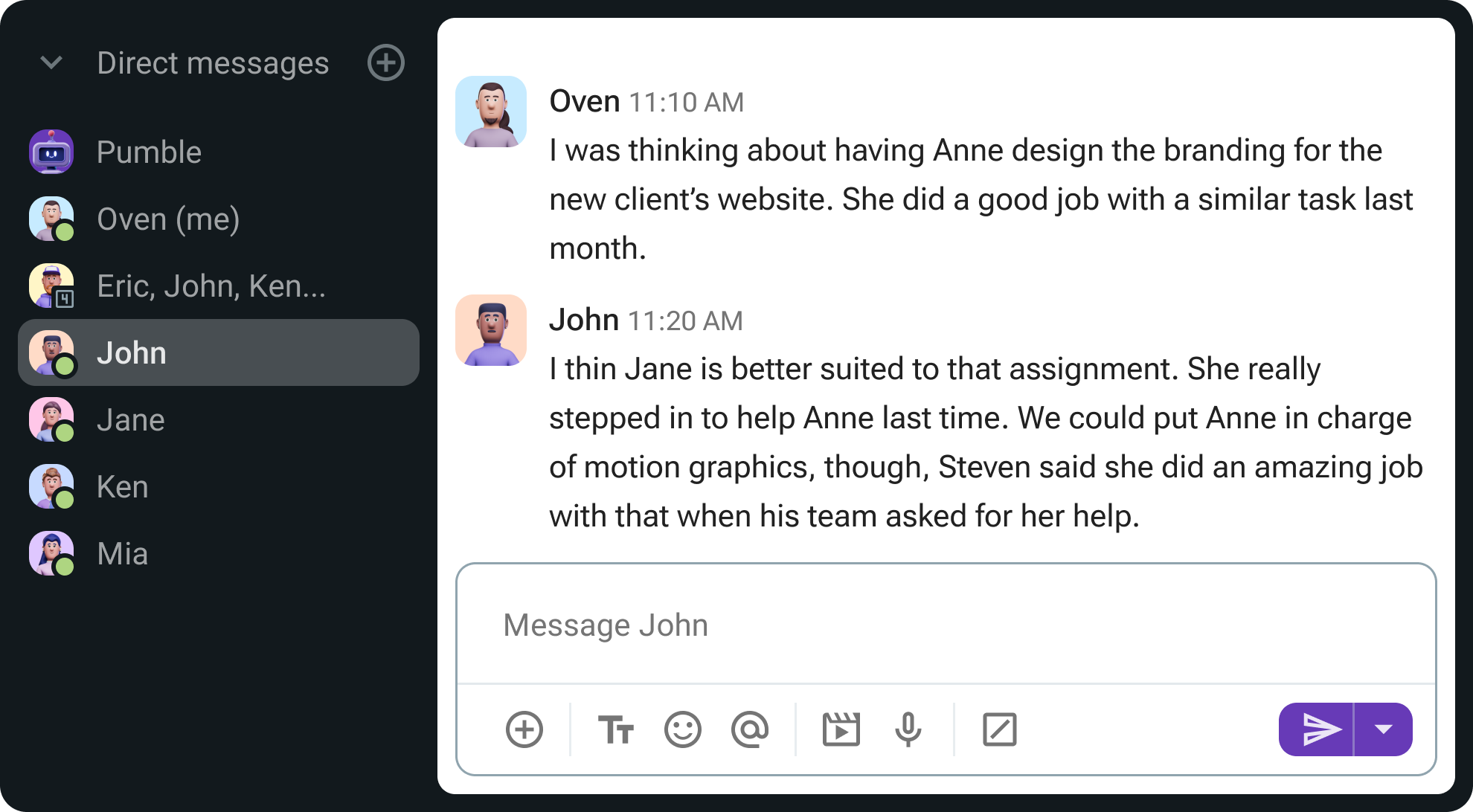
#3: Asking for help creates opportunities for bonding with others
In her book Reinforcements: How to Get People to Help You, social psychologist Heidi Grant claims that asking for help brings out the best in people:
“There is no better way to allow someone to feel good about themselves than to ask them to help you. It brings out the best — and the best feelings — in all of us.”
Heidi Grant
When you ask your coworkers for help, you create opportunities for them to share their talents, empowering them to shine.
That allows you to learn about your coworkers’ strengths and connect with them.
If you’re still not convinced and are a stickler for science, here’s one fact for you.
When we ask others for help, we both release oxytocin, a powerful hormone that stimulates bonding.
💡 Pumble Pro Tip
To get a better understanding of why connection is critical to your (remote) team and how to help your team feel more connected, be sure to check out our guide on the blog:
#4: Asking for help allows you to develop and learn
Asking for help comes with feeling uncomfortable and admitting that you can’t do everything alone.
And, as it happens, getting out of your comfort zone is essential if you want to grow in any area of your life.
When you ask your coworker for help, you are stepping into unknown territory and on your way to learning something new.
Any discomfort you might experience when asking for help is a small price to pay for an opportunity to develop and learn.
That is a sure-fire way to develop a growth mindset — a common denominator of successful people, allowing you to embrace challenges and develop your abilities through dedication and hard work.
Don’t waste time waiting around: Ask for help via Pumble
When asking for help, knowing who to ask and how is essential.
To successfully execute this, you need the right medium for the exchange.
Pumble, a workplace communication app, is your best companion when looking for effective ways to receive help in the workplace.
Pumble lets you:
- Quickly find people who can help you,
- Send them a direct or group message, and
- Get a quick reply in threads.
Sometimes, written communication won’t seem adequate to convey your problem. In those instances, you can record a voice or video message in Pumble and explain your situation in more context.

Pumble works on every platform and device and lets you share files and discuss any documentation you need help with on the go or from your office desk.
But what happens if DMs simply don’t cut it? Well, then just jump on an audio or a video call for a more immediate and direct approach.
Get a helping hand with Pumble — try it today for free!
And, if you want to increase your business’s productivity, try out CAKE.com’s Productivity Bundle!

